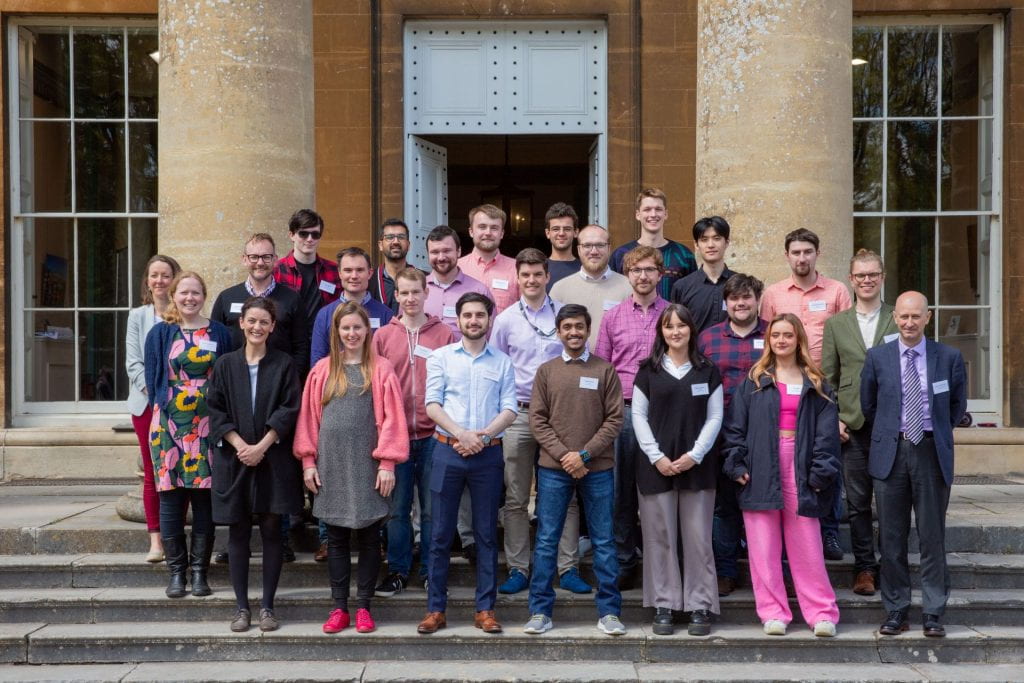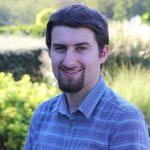2022-23 Cohort
Our fourth cohort of 20 students started their PhD studies in September 2022. Find out more about their interests and research projects below.

Tom O'Hara - University of Bristol

Project: Venus, Volcanoes and Vacuum Cleaners: Understanding Triboelectric Charging in Aerosols
Supervisors: Prof. Karen Aplin, Dr Alberto Gambaruto
Tom graduated from Durham University with an integrated Master’s in chemistry (MChem) carrying out his research on “Defects in Colloidal Crystals on Conical Surfaces”. He is pursuing the investigation of colloidal processes further through his PhD in “Understanding Triboelectric Charging in Aerosols” under Prof. Karen Aplin, with broad applications ranging from atmospheric electricity to industrial processes. In his spare time, Tom also enjoys playing volleyball and the flute.
Conlan Broderick - University of Bristol

Project: Time-resolved Photochemistry of Organic Solutes in Aqueous Microdroplets
Supervisors: Dr Bryan R. Bzdek, Prof. Andrew J. Orr-Ewing & Dr Thomas A. A. Oliver
Graduated in 2022 from Cardiff University with an integrated Masters in Chemistry (with a year in industry), I joined cohort 4 in the same year. My project is investigating the chemistry of photoactive organic compounds (pyruvic acid) in aerosols droplets using time-resolved spectroscopy techniques, such as transient absorption spectroscopy.
Charlie Stainton-Bygrave - University of Manchester

Project: Developing and deploying new sensors for in-situ monitoring of clouds
Supervisors: Dr Jonathan Crosier, Assoc Prof. Chris Stopford, Dr Paul I Williams, Dr Nick Marsden
Charlie holds a Master of Mathematics (MMath) and PGdip in Bioinformatics. His PhD research with the Department of Earth and Environmental Sciences at the University of Manchester, focusses on development of low-cost environmental sensors.
In particular, the research aims to develop new low-cost sensors for measurement of cloud particle size distribution; a key determinant of cloud feedbacks within the climate system. The research overlaps areas of engineering, atmospheric science, aerosol measurement technique and instrumentation design.
Hessam Rasooli Nia - University of Hertfordshire

Supervisors: Dr Michael Cook and Prof. Darragh Murnane
I completed my undergraduate studies at the University of Hertfordshire, graduating with a Master’s degree in Pharmacy. During this time, I developed an interest in researching mental health and alternative drug delivery routes. This interest gradually grew into a fascination and following my Master’s thesis, I made the decision to apply for a PhD once I completed the Pharmacist Foundation Year Training.
This paved my path to join the CDT in Aerosol Science and carry out a PhD, where I aim to use non-Newtonian and thermoresponsive materials to develop next-generation nasal drug delivery formulations for systemic drug delivery, drug delivery to the brain and immunisation.
Ujjawal Arora - University of Manchester

Project: Towards a Better Understanding of the Lifecycle of Pesticides in Atmosphere
Supervisors: Prof. Hugh Coe, Prof. Martin Gallagher, Dr James Allan
Strolling through dewy grass I always used to wonder how much energy nature has in store for us. Going through my subjects in bachelor in chemistry I did realise about some permutation and combinations working through the atmosphere. My Master’s in IIT Bombay enlightened me through the science of aerosol and the kid in my started asking questions again. There I’ve have been closely working on assessing the diurnal and seasonal variations of organic aerosols during monsoon season. This makes me curious in understanding their profound effects on the atmosphere, which landed me in my PhD in University of Manchester.
My PhD focuses on understanding the life cycle of pesticides in atmosphere and the influence of various meteorological parameters on their persistence and transport in the atmosphere. The project will entail calculating eddy correlation fluxes of pesticides by taking into account real-time on field measurements.
Kennedy Peek - University of Bristol

Project: Comparing the airborne survival of enveloped and non-enveloped viruses
Supervisors: Prof. Andrew Davidson and Prof. Jonathan Reid
Kennedy completed his undergraduate degree in Medical Science at Oxford Brookes University, followed by an MSc in Molecular Biosciences (Microbiology) at the University of Bath. After obtaining his degrees, he worked as an Assistant Scientist at Wessex Water, focusing on investigating water sample contamination by Legionella, a bacterial species commonly transmitted through inhalation of contaminated aerosols.
Kennedy’s PhD is currently focused on researching the effects of various environmental conditions on the airborne viability of enveloped and non-enveloped viruses. His research aims to shed light on how different environmental factors impact the survival and transmission of these viruses.
Stephen Robertson - University of Manchester

Supervisors: Prof. Gordon McFiggans
After graduating from the University of York with a Bachelor of Science in Chemistry and from the University of Manchester with a Master of Science in the History of Science, Technology, and Medicine, I was able to pursuit my interest in atmospheric research through the EPSRC Centre for Doctoral Training in Aerosol Science.
My project focuses on the characterisation of a new oxidation flow reactor for the formation of secondary organic aerosols. The increased portability and low residence times of this new reactor offer great potential for aerosol focused research, but widespread adoption requires an understanding and characterisation of the reactor and its operating procedures. I hope to produce best practice guidance for future users of this new reactor while assessing its atmospheric relevance based on chemical composition, mass yield, and size distribution of the formed secondary aerosols.
Gregory Marsden - University of Bristol

Project: Radioactive Aerosols in Wall-bounded Turbulent Flow
Supervisors: Prof. Denis Doorly, Prof. Yannis Hardalupas and Dr. Brendan Perry
Gregory holds a BSc in Physics and an MSc in Nanotechnology & Regenerative Medicine from University College London. His PhD research will use computational fluid dynamics to investigate the transport and deposition mechanics of radioactive aerosols in wall-bounded turbulent flows, primarily focusing on scenarios encountered during nuclear decommissioning. The research aims to provide a microscale picture of the transportation, deposition, and coupled physics of radioactive particles within turbulent flows, before using Lagrangian and Eulerian methods to apply any novel insights to macroscale models. A further aim of the research is to reduce the computational cost of such models, by the application and validation of reduced-order modelling techniques.
Melih Engur - Imperial College London

Supervisor: Dr Jorge Bernardino
My name is Melih. I did my undergraduate degree in Medical Science in Wales followed by a masters in Cardiovascular and Respiratory Healthcare at Imperial College London. I am currently pursuing a PhD at the NHLI developing and optimising nanoparticle drug delivery through alveolar epithelial barrier. The research aims to formulate nanoparticles with differing properties to identify which formulations have optimal alveolar uptake and translocate across the epithelial-endothelial barrier.
Erin Kiely - Imperial College London

Project: Interaction of SARS – CoV2 and Influenza Viruses with Particulate Matter Air Pollution
Supervisor: Prof. Alexandra Porter
Erin undertook a BSc in Biomedical Science at the University of Warwick, followed by an MSc in Immunology at the University of Manchester, where she studied the inhibitory effects of prostaglandin E2 on natural killer cells. Her PhD research at Imperial College London will be using electron microscopy to investigate the interactions of particulate matter air pollution with influenza and SARS-CoV-2 viruses. This will include the effects of particulate matter on viral cell entry, viral intracellular trafficking and the cellular immune response to viral infection.
Simon Bate - University of Bristol

Project: Characterisation of microbial cellular surface and genomic effects following aerosol transport
Supervisors: Dr Darryl Hill and Dr Richard Thomas
Simon is a chartered biologist with a postgraduate degree in Microbiology from the University of Edinburgh. Having held a number of research positions, Simon is now employed by Ministry of Defence as a senior research scientist at the Defence Science & Technology Laboratory in Wiltshire. His research primarily focuses on the detection of pathogens within aerosols. His PhD, which is being undertaken on a part-time basis, focuses on understanding the effect of aerosol transport on cellular and genomic structures.
Siriel Saladin - University of Cambridge

Project: Nanoparticles from non-exhaust emissions: lung deposition and potential health impacts
Supervisors: Dr Chiara Giorio
Siriel has a background in industry, where he developed biocides as an analytical technologist. He decided to continue his educational journey and went to the University of Applied Sciences in Switzerland to obtain a bachelor’s degree in chemistry. His curiosity brought him to England in 2021, where he completed a master’s degree in chemistry at the University of Cambridge and discovered his interest in aerosol science.
Siriel’s research addresses particulate matter emissions from car tyres and brakes, with a focus on nanoparticles and human health. The project includes the generation, detection, collection and characterisation of airborne particles, as well as the toxicity testing. Due to the interdisciplinary and empirical nature of his PhD project, he is looking forward to exploring and advancing this area of research.
Xu Zhang - University of Bristol

Project: Photoinitiated Chemistry in Single Levitated Aerosol Droplets using Cavity Ring-Down Spectroscopy
Supervisors: Dr. Michael Cotterell and Prof. Andrew Orr-Ewing
Xu completed an undergraduate degree in Environment Engineering at the University of Wuhan (2016-2020). Afterwards, he moved to Manchester for master’s degree, where he joined Prof. Gorden Mcfiggance’s group for hygroscopic properties of typical SOA. During that period he found his research interest in aerosols’ physiochemical properties.
His PhD focus on the photo chemistry in single levitated droplets using cavity ring down spectroscopy.
Sorrel Haughton - University of Bristol

Project: Responsive Aerosol: A Design Framework for Aerosol with Required Properties
Supervisors: Prof. Jonathan Reid and Prof. Wuge Briscoe
Sorrel undertook an integrated Master’s degree in Chemistry at the University of Bristol from 2018- 2022, after which she decided she wanted to continue her studies and joined the CDT. She has joined the Bristol Aerosol Research Centre (BARC) to be supervised by Professor Jonathan Reid and Professor Wuge Briscoe, and will be investigating how aerosol responds to external stimuli such as heat and relative humidity. Initially, she will explore this through the use of hydrogels, with the aim to assess the extent that aerosol can be designed to have a required response.
Oliver Driver - Imperial College London

Project: The impact of aircraft engine emissions and alternative fuels on contrail formation
Supervisors: Dr Edward Gryspeerdt, Dr Marc Stettler
Oliver studies the climate impact of exhaust contrails—ice clouds which form when aircraft exhaust particles mix with cold, humid air. Contrails have been estimated to cause twice as much warming as aviation CO2. His research focus is the observation of these clouds using geostationary satellites to help validate models used to estimate the change in climate impact, especially as actions designed to mitigate CO2 emissions in aviation are adopted.
Before joining the CDT, Oliver studied Physics at the University of Oxford, including a project studying the efficacy of climate models by comparing shape of cloud regions to satellite data. He has also worked in Data & Analytics for a management consultancy.
Faizan Ahmad - University of Leeds

Project: The structure of exhaled droplets and aerosols
Supervisors: Prof. Andrew Bayly, Dr Nicole Hondrow, Dr Simon Connell
Prior to joining the CDT in Aerosol Science, Faizan completed his masters degree in Environmental Sciences from University of Pannonia in Hungary where he developed research interest in studying atmospheric aerosols and exploring electron microscopy for their characterization.
For his PhD, he will use various microscopy techniques for the characterization of exhaled droplets and aerosols and will further our understanding of the multi-scale structure of exhaled aerosols particles and gain insight into the dynamics and mechanisms occurring as the exhaled droplets dry and their structure is formed.
Joshua Buckingham - University of Bath

Project: Field Effected Aerosol Assisted Chemical Vapour Deposition (FE-AACVD) of Thin Film Materials
Supervisors: Dr Andrew Johnson and Prof. Mike Hill
Josh completed his MChem (hons) degree in chemistry at the University of Bath in 2022. He undertook an industrial placement at Domino Printing Sciences during his degree, where he developed environmentally benign printing inks. He completed his final year project in the Johnson Group investigating inorganic group 14 metallene complexes.
Now Enrolled in the CDT, he is continuing in the Johnson Group and planning to investigate the effect of applying electric and magnetic fields to Aerosol Assisted Chemical Vapour Deposition (AACVD). This research will aim to generate new morphologies of thin film dielectrics and semiconductors with improved electrical performance for the microchip, photovoltaic and capacitor industries.
Henry Blake - Imperial College London

Supervisors: Dr. Stephanie Wright, Dr. David Green, Prof. Martin Gallagher, Prof. David Topping
My project aims to characterise the presence and quantity of airborne microplastic particulate in indoor and outdoor environments by identifying unique chemical tracers for polymeric materials using Pyrolysis Gas Chromatography Mass Spectrometry. I will be exploring novel technologies for microplastic measurements in the field by adapting existing Ultraviolet Laser Induced Fluorescence (UVLIF) techniques.
Samantha Hall - University of Manchester

Project: Workplace lifecycle exposure and health risk for advanced materials
Supervisors: Prof. Martie Van Tongeren, Dr Cyrill Bussy, Dr Delphine Bard
Samantha is a Chartered Physicist with a first-class honours degree in Physics. She is an Exposure Assessment and Control Research Scientist at the Health and Safety Executive’s Science Division where she undertakes research to measure occupational exposures and emissions and evaluate exposure controls across various industries from additive manufacturing to construction. Her PhD project, which she is undertaking part-time, aims to support the safe innovation and commercialisation of advanced materials by evaluating the potential for occupational exposure across the material lifecycle.
Daisy Ann Young - University of Hertfordshire

Project: Digital Microfluidic Lab-on-a-chip for multiplex detection of biomarkers in exhaled breath
Supervisors: Dr Loic Coudron, Dr Laura Urbano, Prof. Ian Johnston
After studying Molecular Biology at the University of Hertfordshire I knew I wanted to continue my education in the form of research. My PhD combines Aerosol Science and Lung Health themes using microfluidic techniques. I hope to develop a non-invasive, diagnostic microfluidic Lab-on-a-chip device that can detect lung diseases.

EPSRC CDT in Aerosol Science
University of Bristol
School of Chemistry
Cantock’s Close
Bristol, BS8 1TS
aerosol-science@bristol.ac.uk
Partner Newsletter
Sign up to receive monthly news and updates from the CDT in Aerosol Science, as well as events, training and research webinars.






